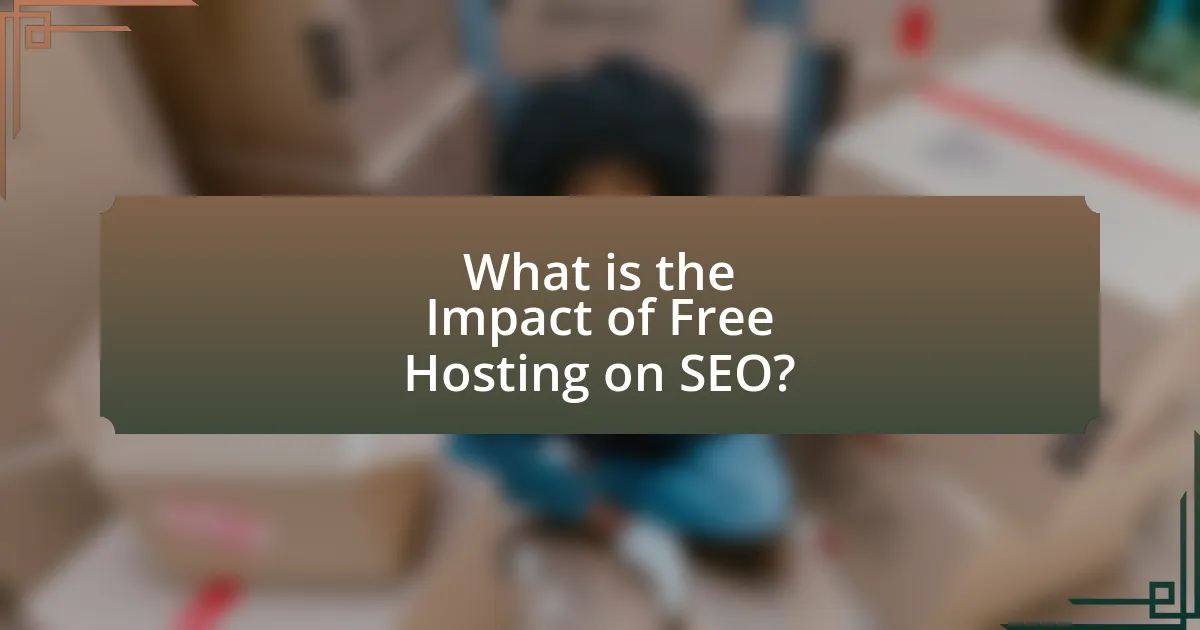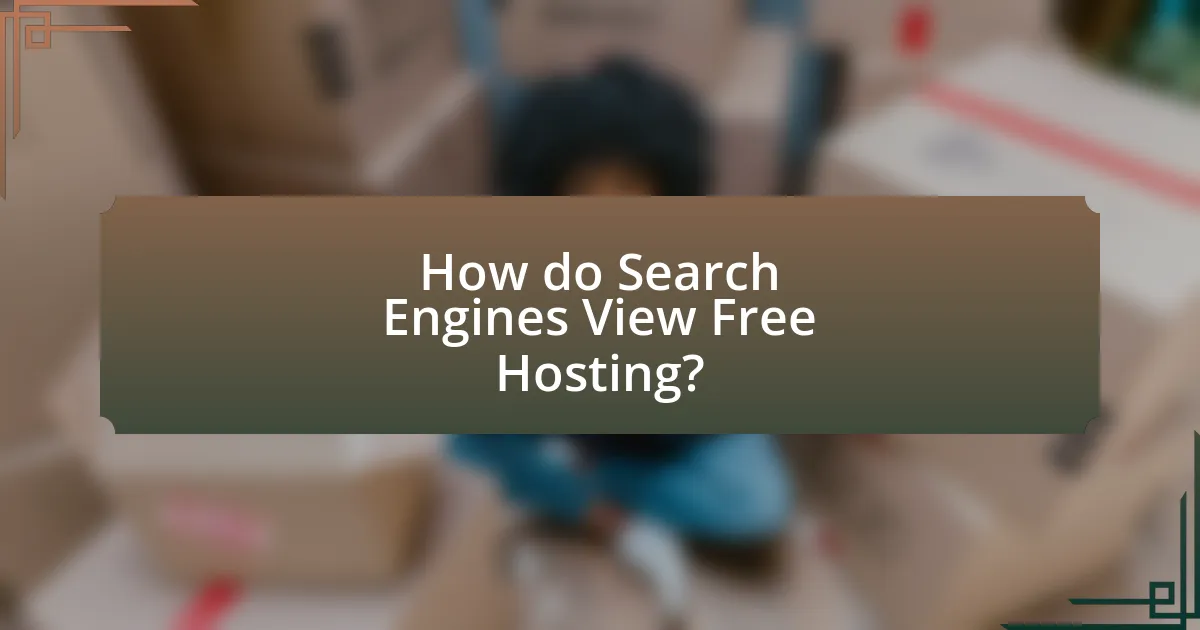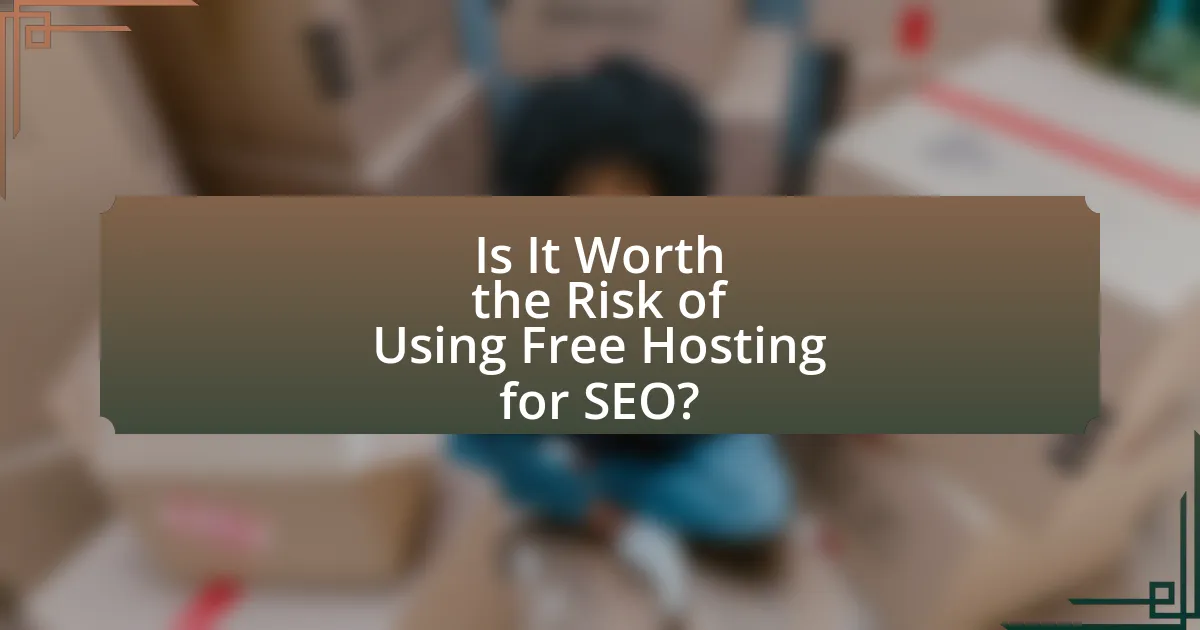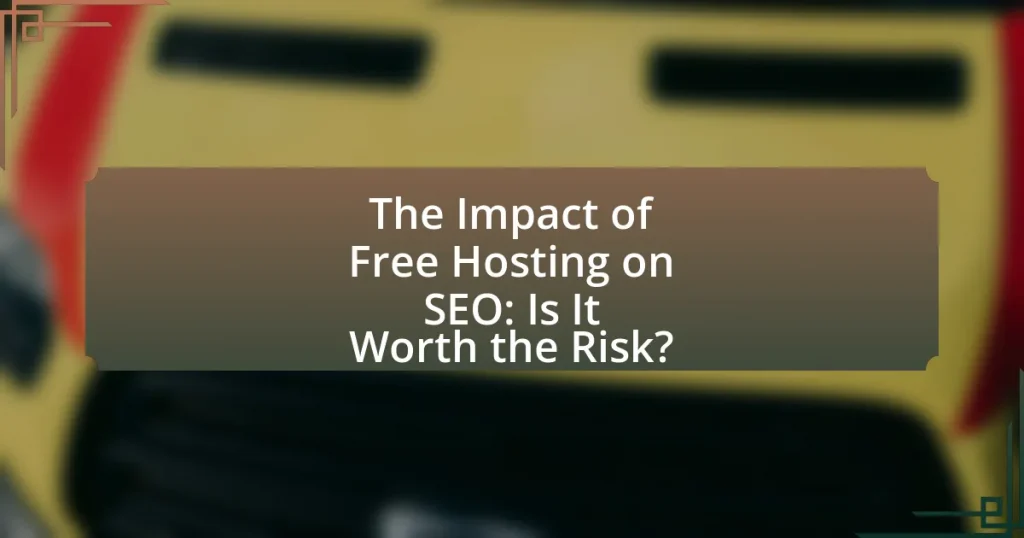The article examines the impact of free hosting on SEO, highlighting its negative effects on website performance, reliability, and search engine rankings. Key issues include slower loading times, frequent downtime, and limitations on bandwidth and storage, which can lead to higher bounce rates and lower visibility in search results. Additionally, the presence of ads on free hosting sites can detract from user experience and credibility, further harming SEO efforts. The article also discusses the risks associated with security vulnerabilities and the advantages of opting for paid hosting services, which offer better performance, support, and SEO tools. Ultimately, it emphasizes the importance of considering these factors before choosing free hosting for a website.

What is the Impact of Free Hosting on SEO?
Free hosting negatively impacts SEO due to several factors, including limited resources, lack of control, and potential security issues. Websites on free hosting often experience slower loading times and frequent downtime, which can lead to higher bounce rates and lower search engine rankings. Additionally, free hosting services may impose restrictions on bandwidth and storage, limiting the site’s ability to grow and perform optimally. Furthermore, many free hosting providers display ads on user sites, which can detract from user experience and credibility, further harming SEO efforts. Studies show that websites with faster load times and better user experience rank higher in search results, reinforcing the idea that free hosting can hinder SEO performance.
How does free hosting influence website performance?
Free hosting negatively influences website performance by often providing limited resources, slower loading times, and increased downtime. Websites on free hosting platforms typically share server space with numerous other sites, leading to resource contention that can slow down performance. According to a study by Google, a one-second delay in loading time can lead to a 20% decrease in conversion rates, highlighting the critical importance of speed for user engagement and retention. Additionally, free hosting services may lack reliable uptime guarantees, resulting in frequent outages that can further degrade user experience and search engine rankings.
What are the common limitations of free hosting services?
Common limitations of free hosting services include restricted bandwidth, limited storage space, lack of customer support, and the presence of advertisements. These services often impose bandwidth caps, which can lead to slow loading times and downtime during high traffic periods. Additionally, storage limitations can hinder the ability to host larger websites or applications. Free hosting typically offers minimal or no customer support, making it difficult for users to resolve issues. Furthermore, many free hosting providers display ads on users’ sites, which can detract from the user experience and negatively impact SEO rankings.
How do these limitations affect SEO rankings?
Limitations of free hosting negatively affect SEO rankings by reducing website performance, reliability, and control over SEO practices. Websites hosted on free platforms often experience slower loading times, which can lead to higher bounce rates; Google considers page speed a ranking factor. Additionally, free hosting services may impose restrictions on bandwidth and storage, causing downtime or limited access, further harming user experience and search visibility. Furthermore, these platforms typically lack advanced SEO tools and customization options, limiting the ability to optimize meta tags, URLs, and other critical elements that influence search engine rankings. Consequently, the combination of poor performance, restricted features, and potential downtime can significantly diminish a website’s ability to rank well in search engine results.
What are the potential risks of using free hosting for SEO?
Using free hosting can significantly harm SEO due to several risks. First, free hosting often comes with limited bandwidth and server resources, which can lead to slow loading times; according to Google, page speed is a ranking factor, and slower sites can negatively impact search visibility. Second, free hosting providers may display ads on your site, which can detract from user experience and credibility, leading to higher bounce rates that search engines interpret as a sign of low-quality content. Third, free hosting services may lack proper security measures, making websites vulnerable to hacks and malware, which can result in penalties from search engines. Lastly, free hosting often does not allow for a custom domain, which can hinder brand recognition and trustworthiness, both of which are important for SEO.
How can free hosting lead to poor user experience?
Free hosting can lead to poor user experience due to limited resources, unreliable uptime, and lack of customer support. Users often encounter slow loading times because free hosting services typically allocate minimal bandwidth and server resources, which can frustrate visitors and increase bounce rates. Additionally, free hosting providers may experience frequent outages, resulting in websites being inaccessible, which negatively impacts user trust and engagement. Furthermore, the absence of dedicated customer support means that issues may remain unresolved for extended periods, further diminishing the overall user experience.
What security issues are associated with free hosting?
Free hosting services often expose users to significant security issues, including data breaches, malware infections, and lack of support for security updates. These platforms typically have limited resources to implement robust security measures, making them attractive targets for cybercriminals. For instance, a study by the Cybersecurity & Infrastructure Security Agency (CISA) highlighted that free hosting providers frequently lack encryption protocols, which can lead to unauthorized access to sensitive information. Additionally, users may face risks from shared hosting environments where vulnerabilities in one site can compromise others on the same server.
What are the benefits of using paid hosting over free hosting?
Paid hosting offers several benefits over free hosting, primarily in terms of reliability, performance, and support. Paid hosting typically provides dedicated resources, ensuring faster load times and better uptime, which are crucial for maintaining a positive user experience and improving SEO rankings. For instance, a study by Google indicates that a one-second delay in page load time can lead to a 20% decrease in traffic. Additionally, paid hosting services often include enhanced security features, such as SSL certificates and regular backups, which protect websites from cyber threats and data loss. Furthermore, paid hosting usually comes with customer support, allowing users to resolve technical issues promptly, whereas free hosting often lacks adequate support. These factors collectively contribute to a more professional online presence and can significantly impact a website’s SEO performance.
How does paid hosting improve website speed and reliability?
Paid hosting improves website speed and reliability by providing dedicated resources and optimized server environments. Unlike free hosting, which often shares resources among multiple users, paid hosting typically allocates specific bandwidth, storage, and processing power to each website, resulting in faster load times. For instance, a study by Google found that a one-second delay in page load time can lead to a 20% decrease in conversions, highlighting the importance of speed for user engagement. Additionally, paid hosting services often include advanced technologies such as Content Delivery Networks (CDNs) and caching solutions, which further enhance performance and ensure consistent uptime. This reliability is crucial for maintaining a positive user experience and improving search engine rankings, as search engines prioritize fast-loading and stable websites.
What advantages does paid hosting offer in terms of SEO tools?
Paid hosting offers several advantages in terms of SEO tools, primarily through enhanced performance, reliability, and access to advanced features. These hosting services typically provide faster loading times, which is a critical factor for search engine rankings, as Google considers page speed in its algorithms. Additionally, paid hosting often includes dedicated IP addresses and SSL certificates, both of which can improve site credibility and security, further benefiting SEO. Furthermore, many paid hosting providers offer integrated SEO tools, such as analytics, keyword tracking, and optimization suggestions, which empower users to effectively manage and improve their site’s search visibility.

How do Search Engines View Free Hosting?
Search engines generally view free hosting with skepticism due to potential issues related to reliability, performance, and security. Websites hosted on free platforms often experience slower loading times and higher downtime, which can negatively impact user experience and search engine rankings. Additionally, free hosting services may impose restrictions on bandwidth and storage, further limiting a site’s performance.
Moreover, many free hosting providers display ads on user sites, which can detract from the site’s professionalism and user engagement. Search engines prioritize high-quality, user-friendly websites, and those hosted for free may struggle to meet these criteria. Consequently, sites on free hosting may face challenges in achieving favorable rankings in search engine results pages.
What factors do search engines consider when ranking websites on free hosting?
Search engines consider several factors when ranking websites on free hosting, including domain authority, site speed, mobile-friendliness, and the quality of content. Domain authority is crucial as it reflects the credibility and trustworthiness of a website; free hosting often leads to lower authority due to shared IP addresses and lack of custom domains. Site speed is another significant factor, as slow-loading pages can negatively impact user experience and search rankings. Mobile-friendliness is essential, given the increasing number of users accessing websites via mobile devices; free hosting services may not always optimize for mobile. Lastly, the quality of content is vital; search engines prioritize original, relevant, and valuable content, which can be challenging to maintain on free hosting platforms that may impose restrictions.
How does domain authority play a role in SEO for free hosting?
Domain authority significantly influences SEO for free hosting by determining a website’s credibility and ranking potential in search engine results. Websites hosted on free platforms often have lower domain authority due to shared IP addresses and lack of established trust, which can hinder their visibility. Research indicates that higher domain authority correlates with better search engine rankings; for instance, Moz’s Domain Authority metric shows that sites with scores above 40 tend to rank higher than those below this threshold. Consequently, free hosting can limit a site’s ability to build domain authority, negatively impacting its SEO performance.
What impact does website downtime have on search engine rankings?
Website downtime negatively impacts search engine rankings by causing search engines to perceive the site as unreliable. When a website is frequently unavailable, search engines may lower its ranking due to poor user experience and increased bounce rates. Studies indicate that prolonged downtime can lead to a significant drop in organic traffic, as search engines prioritize sites that consistently deliver content. For instance, Google’s algorithms consider site availability as a ranking factor, meaning that consistent downtime can result in decreased visibility in search results.
Why might search engines penalize websites on free hosting?
Search engines might penalize websites on free hosting due to issues related to low-quality content, lack of control over the hosting environment, and potential for spammy behavior. Websites on free hosting often share IP addresses with numerous other sites, increasing the likelihood of being associated with spam or malicious content, which can lead to penalties. Additionally, free hosting services may not provide the necessary security measures, resulting in vulnerabilities that can be exploited, further harming the site’s reputation and search engine ranking.
What are the consequences of using a shared IP address on free hosting?
Using a shared IP address on free hosting can lead to several negative consequences, primarily affecting website performance and SEO. Websites sharing the same IP may experience slower loading times due to resource contention, which can result in higher bounce rates and lower user engagement. Additionally, if one site on the shared IP engages in spammy or malicious activities, search engines may penalize all sites on that IP, leading to decreased visibility in search results. Research indicates that websites with dedicated IP addresses often rank better in search engines, as they are perceived as more trustworthy and reliable. Therefore, using a shared IP address can significantly hinder a website’s SEO potential and overall online reputation.
How does the presence of ads on free hosting affect SEO?
The presence of ads on free hosting negatively affects SEO by reducing user experience and increasing bounce rates. When ads are intrusive or irrelevant, they can distract visitors, leading to shorter site visits and higher exit rates, which search engines interpret as a sign of low-quality content. Additionally, free hosting services often have limited control over ad placement, which can result in ads that conflict with the site’s branding or content, further diminishing user engagement. Research indicates that sites with high bounce rates are penalized in search rankings, making it crucial for website owners to consider the implications of ads on their SEO strategy.

Is It Worth the Risk of Using Free Hosting for SEO?
Using free hosting for SEO is generally not worth the risk. Free hosting often comes with limitations such as slower loading speeds, lack of control over server settings, and potential downtime, all of which can negatively impact search engine rankings. Additionally, free hosting services may display ads on your site, which can detract from user experience and credibility. Research indicates that website speed and reliability are critical factors for SEO performance; for instance, Google has confirmed that page speed is a ranking factor. Therefore, the drawbacks of free hosting can outweigh any potential benefits, making it a risky choice for those serious about optimizing their SEO.
What should website owners consider before choosing free hosting?
Website owners should consider the limitations of free hosting services, including bandwidth restrictions, lack of customer support, and potential negative impacts on SEO. Free hosting often comes with limited resources, which can lead to slow loading times and downtime, both of which are detrimental to user experience and search engine rankings. Additionally, many free hosting providers display ads on users’ websites, which can detract from professionalism and user engagement. According to a study by Backlinko, page speed is a ranking factor for Google, meaning that slow-loading sites can adversely affect SEO performance. Furthermore, free hosting may not offer the same level of security as paid options, increasing vulnerability to attacks, which can also harm SEO. Therefore, website owners must weigh these factors carefully before opting for free hosting.
How can website owners assess their SEO needs against free hosting limitations?
Website owners can assess their SEO needs against free hosting limitations by evaluating the specific features and restrictions of the free hosting service. Key factors to consider include the availability of custom domain names, bandwidth limits, storage capacity, and the presence of ads, as these can significantly impact site performance and search engine rankings. For instance, a study by Moz indicates that page load speed and mobile responsiveness are critical ranking factors; if a free hosting service compromises these aspects, it may hinder SEO efforts. Additionally, website owners should analyze whether the hosting provider allows for essential SEO tools and plugins, as their absence can limit optimization capabilities.
What alternatives to free hosting can provide better SEO outcomes?
Paid hosting services, such as shared, VPS, or dedicated hosting, provide better SEO outcomes compared to free hosting. These paid options typically offer enhanced performance, faster loading times, and improved uptime, all of which are critical factors for search engine rankings. For instance, Google considers page speed as a ranking factor, and websites hosted on reliable paid services often load faster due to optimized server resources. Additionally, paid hosting usually allows for custom domain names, which can enhance brand credibility and trustworthiness, further positively impacting SEO.
What best practices can mitigate risks associated with free hosting?
To mitigate risks associated with free hosting, users should prioritize selecting reputable providers, implementing regular backups, and utilizing security measures such as SSL certificates and firewalls. Reputable providers often have better security protocols and uptime guarantees, reducing the likelihood of data breaches or downtime. Regular backups ensure that data can be restored in case of loss or corruption, which is crucial given that free hosting services may not offer reliable data recovery options. Additionally, employing security measures like SSL certificates enhances data encryption, while firewalls protect against unauthorized access, further safeguarding the website. These practices collectively reduce vulnerabilities and enhance the overall security and reliability of websites hosted on free platforms.
How can website owners optimize their site on free hosting for better SEO?
Website owners can optimize their site on free hosting for better SEO by focusing on content quality, keyword optimization, and mobile responsiveness. High-quality, relevant content attracts organic traffic and encourages backlinks, which are crucial for SEO. Implementing targeted keywords in titles, headings, and throughout the content enhances visibility in search engine results. Additionally, ensuring the site is mobile-friendly is essential, as Google prioritizes mobile-optimized sites in its rankings. According to Google’s mobile-first indexing policy, sites that are not mobile-responsive may suffer in search rankings, making this optimization critical for success.
What are the key indicators of when to upgrade from free hosting?
Key indicators for upgrading from free hosting include frequent downtime, limited bandwidth, lack of customer support, and restrictions on storage and features. Frequent downtime can negatively impact user experience and SEO rankings, as search engines favor reliable sites. Limited bandwidth may lead to slow loading times, which also affects SEO performance. A lack of customer support can hinder problem resolution, while restrictions on storage and features can limit website growth and functionality. Upgrading ensures better performance, reliability, and support, which are crucial for maintaining and improving SEO.
